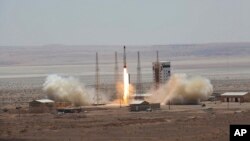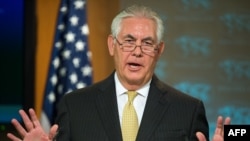The United States, Britain, France and Germany have called Iran's recent rocket test “inconsistent” with a U.N. Security Council resolution and asked the U.N. chief to investigate it.
“This launch therefore represents a threatening and provocative step by Iran,” says the letter sent Wednesday to U.N. Secretary-General António Gutteres and the president of the Security Council by the United States on behalf of the four powers.
Last Thursday, Iran announced that it had successfully fired a rocket carrying a satellite into space. Tehran claimed the Simorgh rocket is capable of carrying a 250-kilogram satellite as far as 500 kilometers (311 miles) above Earth, but did not elaborate on the payload of the rocket fired last week.
The launch followed the U.S. move in July to increase economic sanctions placed on Iran for its ballistic missile program.
Under the text of the 2015 nuclear deal that limited Iran's nuclear activity in return for sanctions relief, ballistic missile tests are not expressly prohibited. But the document was endorsed by the U.N. Security Council in a resolution that further says Iran is “called upon” not to undertake any ballistic missile related activity.
Wednesday's letter says Iran's launch is “inconsistent” with that section of the resolution.
“We call on Iran to immediately cease all activities related to ballistic missiles designed to be capable of delivering nuclear weapons, including launches using such ballistic missile technology,” the four powers wrote in their letter.
“In our reading of the JCPOA this is not a violation of the agreement because it concerns other things, which were not directly written into the JCPOA,” Russia's new U.N. Ambassador Vassily Nebenzia told reporters, referring to the Iran deal by its acronym,
Iran has repeatedly asserted that it is well within its rights to conduct the missile tests, and multiple officials have said new U.S. sanctions targeting the country's ballistic missile program amount to a breach of the nuclear deal.
Iranian Deputy Foreign Minister Abbas Araghchi, who was Iran's chief negotiator for the nuclear talks, said after U.S. President Donald Trump signed the sanctions bill that Iran will come up with a “smart” response.
U.S. Secretary of State Rex Tillerson said Tuesday the United States is working with the other parties, which include Britain, France, China, Russia and Germany, in order to fully enforce the terms of the Iran deal and challenge whether Iran is "living up to its commitments and the spirit of the agreement."
During his campaign, President Trump dismissed the 2015 agreement as a terrible deal and threatened to pull out from it. On Tuesday, Secretary Tillerson left that option open.
“It's an agreement that should serve Americans. America's interests first and foremost, and if it doesn't serve that interest, then why would we maintain it?” Tillerson told reporters.
Weapons trade
Meanwhile, U.N. Ambassador Nikki Haley singled Iran out for criticism during a debate Wednesday on the flow of weapons to terrorist groups.
“One country stands out for its deliberate, systematic contributions of weapons, training and funding for terrorist groups,” Haley said. “One country uses its support for terrorist proxies to conduct its foreign policy and to compensate for its own weakness. That country is Iran.”
She pointed to Iran’s support for groups like Hamas and Hezbollah, and its interference in Iraq and Syria.
The Security Council unanimously adopted a resolution Wednesday seeking to prevent terrorist groups from acquiring weapons. Haley said technical cooperation and security upgrades would not be enough to diminish the threat from Iran.
“As long as we allow the Iranian regime to violate this council’s prohibitions with impunity, it will be a source of weapons to terrorist groups that will only grow in volume and destructive capability,” Haley warned.





